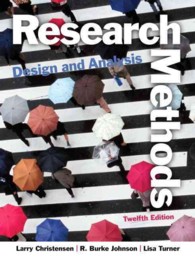Full Description
'Theology in Language, Rhetoric, and Beyond' places before a broad audience of students and general readers theological essays on both the Old and New Testaments. Theology is seen to derive from a number of sources: the biblical language, biblical rhetoric and composition, academic disciplines other than philosophy, and above all a careful exegesis of the biblical text.
The essay on Psalm 23 makes use of anthropology and human-development theory; the essay on Deuteronomy incorporates Wisdom themes; the essay called "Jeremiah and the Created Order" looks at ideas not only about God and creation but also about the seldom-considered idea of God and a return to chaos; and the essay on the "Confessions of Jeremiah" examines, not the words that this extraordinary prophet was given by God to preach, but what he himself felt and experienced in the office to which he was called. One essay on "Biblical and theological themes" includes a translation into the African language of Lingala, which weaves together the story of early Christianity with the more recent founding of churches in Africa and Asia.
Jack R. Lundbom argues eloquently through these essays that theology is rooted in biblical words, in themselves, in rhetoric and their different contexts.
Contents
Permissions
Preface
Abbreviations
1 Grace and Favor in the Old Testament: Hebrew hnn
2 Burning Anger in the Old Testament: Hebrew hrh, yst, and yqd
3 God in Your Grace Transform the World
4 Biblical and Theological Themes
Translation into Lingala - Rev. Richard Anderson
5 Deuteronomy
6 Yahweh Comes to Be King on Earth (Deut 33:2-5)
7 And the Word of the Lord Came to Huldah
8 Jeremiah and the Created Order
9 The Confessions of Jeremiah
10 Psalm 23: Song of Passage
11 Mary Magdalene and Song of Songs 3:1-4
12 All Great Works of God Begin in Secret
13 Theology in Language, Rhetoric, and Beyond
Index of Scriptural References
Index of Authors and Names








